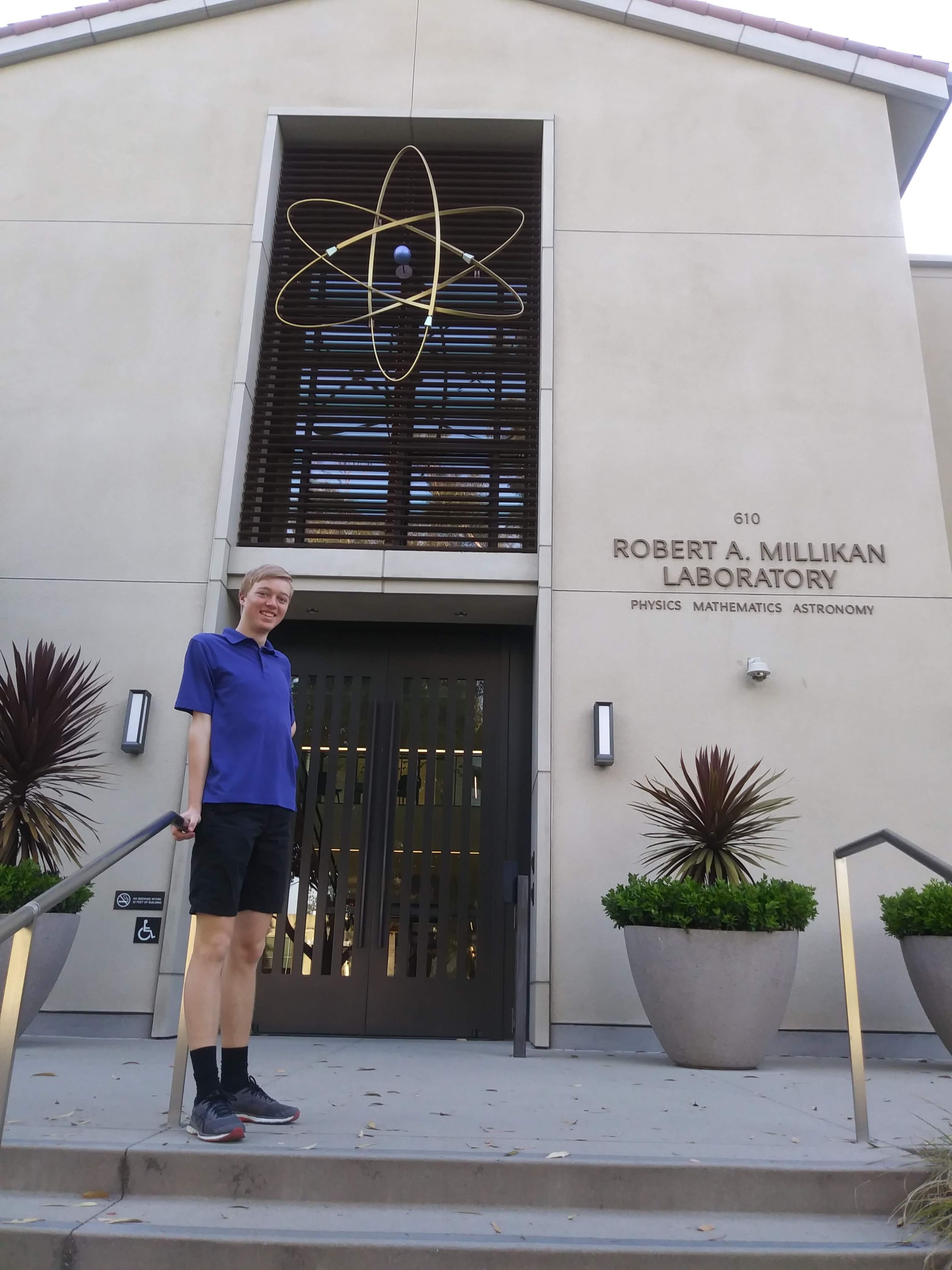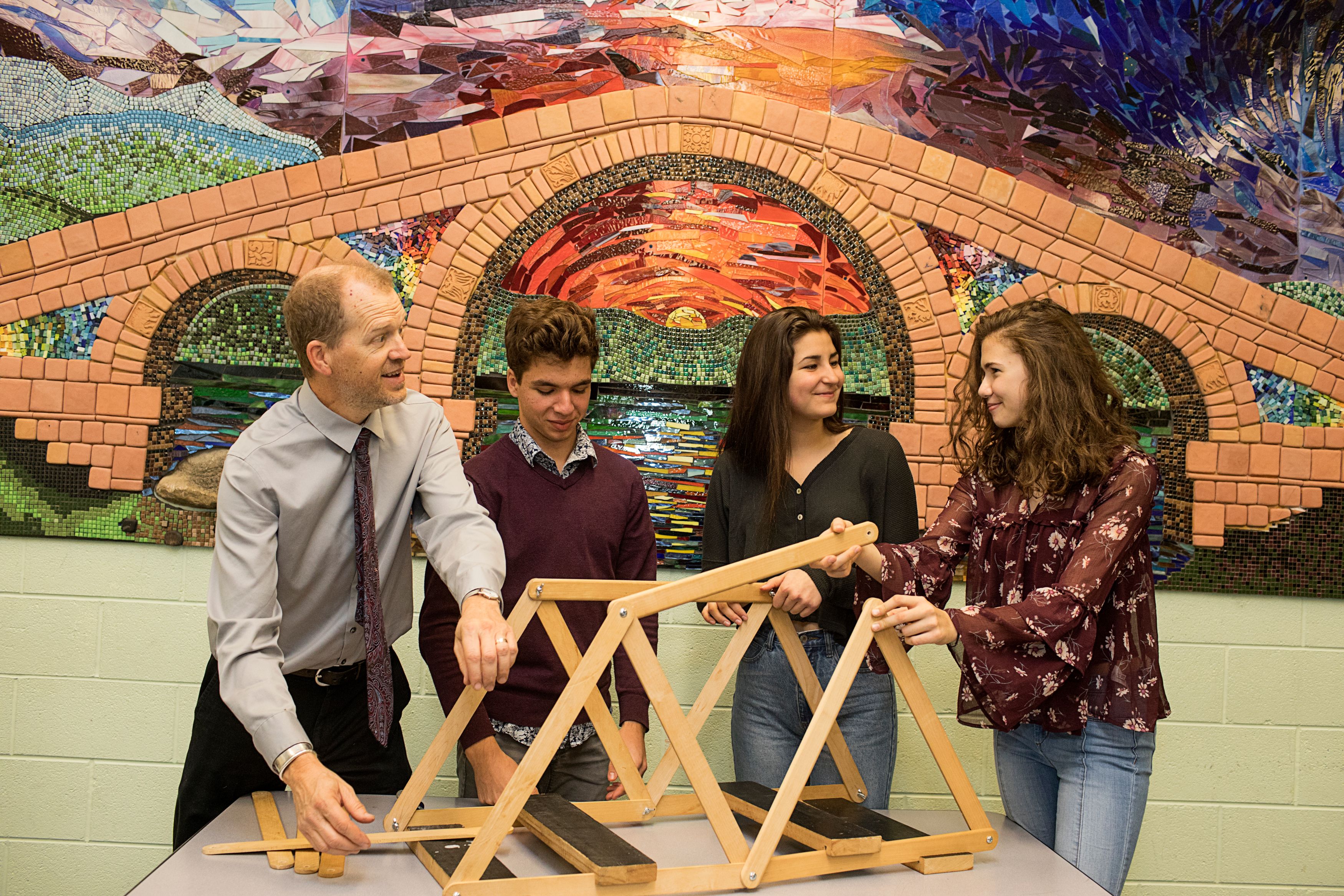

Surpassing STEM

When my husband, Ryan, and I made the commitment to send both of our children to a Waldorf School through High School (Marcus, Shining Mountain Waldorf School Class of 2019, and Kalea, RSSAA Class of 2022) we weren’t too sure that it would provide our kids a solid foundation in math and science, as we were both educated to become engineers through the traditional public school model. Boy, were we wrong! Little did we know at the time just how well-prepared our children would be to pursue a scientific path. 
I remember when our son, Marcus, who is now 21 and a junior studying Astrophysics at Pomona College in Claremont, CA, would come home from his Waldorf kindergarten and my husband would ask him what “he learned today”. We would be regaled with his circle time songs, told about the rocket ships he built and how he flew to the moon, and all the tunnels he dug in the sandbox. As he went through the lower grades, we saw him devote his free time to marble runs, Legos, and domino effects. He didn’t pick up reading until the middle of second grade, but once he did, he was off, and would alternate his free time between reading and building. He started private piano lessons in first grade and started playing the violin at school (with more lessons) in fourth grade. He loved his middle school science blocks, especially the Rube Goldberg Project, which he spent weeks working on. In high school, he picked up the nyckelharpa, a Swedish folk instrument, and switched from both classical piano and violin to folk fiddle music and composing his own music, complete with lyrics.
We did all we could to keep Marcus off all screens while he was in the lower school, especially video games, which can be so addicting to adolescent boys. He did not receive his own computer until the end of 8th grade and by the end of high school he had taught himself how to code, writing simple programs that played April Fools’ tricks on my laptop. Though he never took a formal music editing class, for his Senior Project he wrote, composed, produced, and published his own album, using a local non-profit music studio to teach himself the editing process.
He did not take a single advanced placement or college course, only the standard Waldorf math curriculum through calculus, but was able to place out (via the college’s testing process) of the first two semesters of calculus when he entered Pomona College as a freshman.
An experience that really drove home how remarkable the math education he was receiving was happened when we were visiting some friends with a daughter the same age, and he was talking to her about 11th grade math and the parabolic equations they were deriving and working on. He had written a very simple program on his tablet that graphed the parabolic equations and was showing this to his friend, who said she knew the equations but had no idea what the parabolas meant as they moved in response to different inputs. She had been taught to “plug and chug” the formula, but he knew exactly how the formula worked and what it really meant.
 He has taken that deep-seated understanding of science and math that he learned in the Waldorf high school and has taken up his studies at Pomona with enthusiasm, curiosity, and joy. He is currently a straight-A student in his major and this semester is taking Einstein Physics (Relativity), Quantum Mechanics, and a math class called Combinatorics. Last summer he was selected by NIST (National Institute of Science and Technology) to join their SURF (Summer Undergraduate Research Fellowship) in the Applied Math lab. His job was to use Python Coding to support a team of mathematicians in building an online interface for first responders. When I asked him where he learned to do Python coding, he told me he hadn’t, but he had used another coding program to build an open-source platform for users of the popular video game, Minecraft. In fact, his platform had gotten him into a contest with 99 other Minecraft programmers to compete in an online game to win a real Lamborghini! I’m not sure what he would have done if he won, but the fact that his “fooling around for fun” on these programs even got him a chance to win a $200,000 car was quite surprising. He self-taught himself Python programming “on the job” and ended up finishing his part of the project earlier and was assigned to build out a larger portion of the interface by his two mentors.
He has taken that deep-seated understanding of science and math that he learned in the Waldorf high school and has taken up his studies at Pomona with enthusiasm, curiosity, and joy. He is currently a straight-A student in his major and this semester is taking Einstein Physics (Relativity), Quantum Mechanics, and a math class called Combinatorics. Last summer he was selected by NIST (National Institute of Science and Technology) to join their SURF (Summer Undergraduate Research Fellowship) in the Applied Math lab. His job was to use Python Coding to support a team of mathematicians in building an online interface for first responders. When I asked him where he learned to do Python coding, he told me he hadn’t, but he had used another coding program to build an open-source platform for users of the popular video game, Minecraft. In fact, his platform had gotten him into a contest with 99 other Minecraft programmers to compete in an online game to win a real Lamborghini! I’m not sure what he would have done if he won, but the fact that his “fooling around for fun” on these programs even got him a chance to win a $200,000 car was quite surprising. He self-taught himself Python programming “on the job” and ended up finishing his part of the project earlier and was assigned to build out a larger portion of the interface by his two mentors.
I share this experience with our son not only because, as his mother, I am incredibly proud of him, but because I am convinced that his Waldorf education is the source of his success.
Marcus did not attend fancy science camps in the summers, he did not get additional tutoring outside of school, and he didn’t have the “latest and greatest” toys, technology gadgets, or computers. We did invest in private music lessons, which we believe were beneficial to his mind as well as his soul. He is truly a “math/music” person, he loves to learn, he can teach himself anything, and he is passionate about physics and math. As a junior in college, he is not sure yet what he wants to do after graduation, but it doesn’t matter. He will find his way, as all Waldorf graduates do.
In doing some research for this blog, I came across two interesting articles that also support this connection between Waldorf education and success in STEM disciplines. They can be found here:
State of Sciences Event Brings Creativity in Focus. This article shares research on how successful scientists tend to have interests and strengths in multiple subjects, including the arts, and how the arts and their other interests contribute to their success in the sciences. We have certainly seen that in Marcus.
Arts Foster Scientific Success. This article shares the paper that the first article was based on - that studying the arts fosters scientific success.
And finally, I will leave you with some remarks from Thomas Sudhof, who was the 2013 Nobel Prize Winner in Physiology or Medicine. He is currently a Professor of Neuroscience at Stanford University and a graduate of the Hannover Waldorf School in Germany. This quote comes from remarks he delivered at the Waldorf 100 celebration on May 18, 2019, in San Francisco. I agree with him wholeheartedly!
“And thus, I think that the emphasis in Waldorf education on implicit learning—on the arts, on things that you do manually, on language—is actually a very good thing because that emphasizes the strengths of the child during that stage of development. That doesn’t mean one shouldn’t start some explicit learning early on, but I believe one shouldn’t emphasize it. One can still learn things like math and physics in later years in high school, whereas in early years during elementary and middle school, you can learn skills, like in music or language, that are much more difficult to pick up later. And so, in my own experience, I actually learned virtually no science before I came to high school because that’s the way the Waldorf school curriculum was. I don’t think it has hurt me. And I think that it’s more important to develop the strengths and the individuality of the child, and to develop things like language and art in early times and then to move on as the child develops and teach them explicit skills later on. That doesn’t mean we shouldn’t emphasize what’s called the STEM disciplines in the United States, which is science, technology, engineering, and math. We should emphasize them, but we should emphasize them late in the school curriculum in my personal opinion, and I think that is what the Waldorf school curriculum exactly tries to do.”
